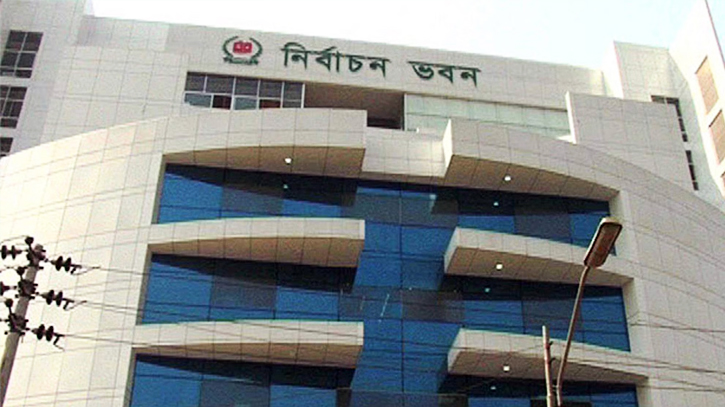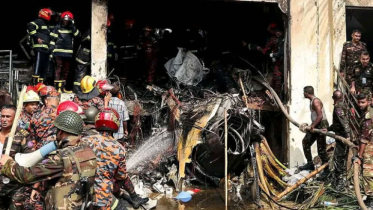
Photo : Collected
The sixth upazila parishad election is scheduled to take place in four phases on May 8 with 1,693 candidates actively campaigning in the final stretch. Despite 26 candidates already securing victory unopposed, the Election Commission faces numerous challenges ahead of this local election. Notably, several political parties, including the BNP, have opted out of the upazila polls, leading to decreased voter turnout. Furthermore, anti-voting campaigns and voter apathy, exacerbated by scorching temperatures and ongoing paddy harvesting activities in rural areas, pose additional hurdles.
Reports of ballot rigging, power abuse, and growing mistrust in election management further complicate the situation. The EC, alongside administrative officials, acknowledges the looming risk of conflicts, as clashes and incidents of violence have already occurred in various regions, prompting concerns over election security and integrity.
Deputy Commissioners (DCs), Superintendents of Police (SPs), Divisional Commissioners, and other relevant officials have ensured the Election Commission (EC) during meetings that administrative personnel at field level, along with them, are committed to addressing risks.
Clashes persist at the grassroots level:
In Gournadi, Barisal, a clash erupted between supporters of opposing factions within the Awami League, vying for influence in the upazila elections on Thursday. Three individuals, including the chairman of the union parishad, sustained injuries.
Similarly, in the Bhola Sadar Upazila Parishad election on Friday night, clashes erupted between supporters of two chairman candidates, resulting in at least 25 injuries on both sides.
Furthermore, on Saturday evening (May 4), Masud Rana, a 35-year-old man, was attacked during an election campaign in Chuadanga Sadar Upazila. Rana was promptly rescued and admitted to Chuadanga Sadar Hospital for treatment.
On Saturday, a clash between supporters of two candidates in Lalmonirhat resulted in injuries to 10 people, including candidates and journalists. Police intervened later to restore order.
Additionally, on May 3, supporters of a Member of Parliament reportedly assaulted a rival candidate at a police station in Belkuchi upazila, Sirajganj.
There were also reports of an attack on chairman candidate Jahangir Hossain Manik in the Bagatipara upazila parishad election of Natore on May 2.
Furthermore, on Thursday night, former Member of Parliament for Cox's Bazar-4 (Ukhia-Teknaf) constituency, Abdur Rahman Badi, was accused of firing at Teknaf Upazila Parishad Chairman Nurul Alam.
The Election Commission (EC) is concerned about the potential deterioration of law and order during the polls. To address this, the election management wing of the organisation has instructed returning officers to establish monitoring teams and law and order cells in districts and upazilas by Tuesday (April 30). These teams consist of Returning Officers, Assistant Returning Officers, representatives of the Superintendent of Police, and designated officers from allied law enforcement agencies. Election commissioners have issued strict directives to field administration officials during district-level election tours to prevent any irregularities surrounding the upazila polls.
The Election Commission has reached out to the Parliament Secretariat, urging Minister-MPs to abstain from exerting immoral influence in the upazila elections. This communication followed a thorough assessment of on-ground situations and concerns expressed by Deputy Commissioners (DCs) and Superintendents of Police (SPs).
Highlighting the contents of the letter penned by the EC Secretary to the Speaker, Election Commissioner Mohammad Alamgir reiterated the Commission's stance. He emphasised that if any relatives of MP ministers are candidates, legal action will be taken against any minister-MPs attempting to exert immoral influence to secure victory for those candidates. All candidates are regarded as equals by the EC.
Furthermore, stringent directives have been issued to field administration officials to ensure impartial treatment of all candidates and to promptly address allegations of unethical pressure or influence by influential individuals surrounding the election process.
Home Secretary Mostafizur Rahman has emphasised the deployment of armed police and union magistrates at each polling center to safeguard the integrity of the electoral process. Following a recent law and order meeting at the secretariat, Rahman revealed plans to allocate 17 to 18 law enforcement officers and 6 armed personnel at polling stations during the upcoming upazila parishad elections. Additionally, each union and upazila will be assigned an executive magistrate. Special striking and mobile forces, comprising Ansar, Police, BGB, RAB, and Coast Guard personnel, will be stationed at five designated centers. In coastal regions, the Coast Guard will assume responsibilities instead of the BGB. To facilitate operations in remote hilly areas, polling officers and materials will be transported via helicopter. Election-related complaints can be lodged through the emergency hotline 999, and mechanisms will be in place to track the handling of each complaint.
According to the Election Commission (EC), a total of 4,959 local observers will be deployed in the field to monitor the voting process in the respective upazilas during the first phase. In compliance with the Election Observation Policy of 2023 and relevant legislation, the Election Commission has granted authorization to 267 central and 4,692 local observers from 28 observer organizations registered with the commission to oversee the election proceedings.
According to the Election Commission (EC), a total of 4,959 local observers will be deployed in the field to monitor the voting process in the respective upazilas during the first phase. In compliance with the Election Observation Policy of 2023 and relevant legislation, the Election Commission has granted authorisation to 267 central and 4,692 local observers from 28 observer organisations registered with the commission to oversee the election proceedings.
EC Additional Secretary Ashok Kumar Debnath said that there is always some tension in our local elections. Strict instructions have been given to the administration by the EC to keep the law and order situation normal at the field level.
Badiul Alam Majumdar, Secretary of SHUJAN, expressed concern, stating, local elections, like national elections, are being conducted unilaterally among themselves. Leaders of the ruling party themselves are becoming candidates here to maintain their influence. That is why conflicts and violence are occurring within the ruling parties themselves.
Messenger/Fameema








